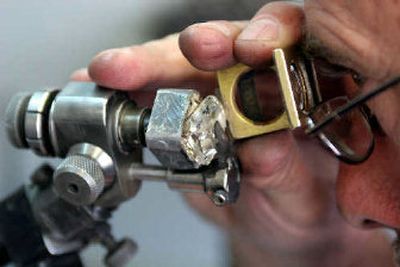South Africa’s multifaceted struggle

CAPE TOWN, South Africa — South Africa’s government on Monday vowed to press ahead with legislative attempts to take greater control of the nation’s diamonds and weaken the grip of diamond-producer De Beers, dismissing arguments that this could disrupt global markets and lead to job losses.
The Diamonds Amendment Bill going through parliament seeks to establish a new State Diamond Trader that would be able to buy rough diamonds. It aims to discourage the export of rough diamonds through a 15 percent tax and to promote the domestic cutting and polishing industry, and was likely to pass because it has the ruling African National Congress’s backing.
Tensions between the government and the white-dominated mining industry are long-standing. The industry stands accused of exploiting South Africa’s natural wealth and resisting moves toward addressing the legacy of apartheid.
South Africa ranks fourth in the world in diamond production, with 2004 production worth some $1.3 billion. But only a small proportion of the precious gems are processed in the country, with the vast majority being exported to London by Johannesburg-based De Beers S.A.
“African countries, with their combined production of diamonds, are nowhere near being the diamond centers of the world,” Minerals and Energy Minister Lindiwe Hendricks told a parliamentary committee.
In parliament on Monday, deputy minerals and energy minister Lulu Xingwana maintained her outspoken attitude, saying she represented a black “constituency which has been excluded for more than a century.”
“We have to transform this industry,” she said. “We have tried to include all the concerns but we are not going to be able to satisfy everyone because some people don’t want to see change.”
“Let there be more equitable access,” she said.
Hendricks said white-dominated mining companies had traditionally tried to discourage South Africa from processing the precious gems and the new legislation was necessary to ensure the traditionally disadvantaged black majority could finally benefit from the country’s natural resources.
Under the existing system, De Beers’ distribution arm, the Diamond Trading Company, sends the rough stones from Africa to London, where they are then sent off to be processed — often in India, where costs are lowest.
De Beers, which is 45 percent owned by the AngloAmerican mining conglomerate, controls more than half the diamond trade.
At heated public hearings last week, both De Beers and AngloAmerican said the proposed legislation would disrupt the world diamond market and force marginal South African diamond mines to close.
In a separate submission, the South African Chamber of Mines said up to 8,500 jobs may be lost.
Tony Leon, of the main opposition Democratic Alliance, described the bill — which is due to be adopted by the parliamentary minerals and energy committee Friday — as “reckless.”
“It will damage the entire industry, from the mine to the jewelry store window,” he said. “It will hurt small producers as well as large ones, black investors along with white.”
Hendricks dismissed the objections.
“We are not killing the goose that lays the golden egg, nor are we nationalizing by the back door,” said Hendricks.
Hendricks said despite the opposition, her department would not budge on its plans for the new state diamond bodies and on the export tax.
“We feel we cannot deviate from these principles because if we do, we will fail the people of South Africa who have been denied access to the benefits of this industry for all these years,” she said.